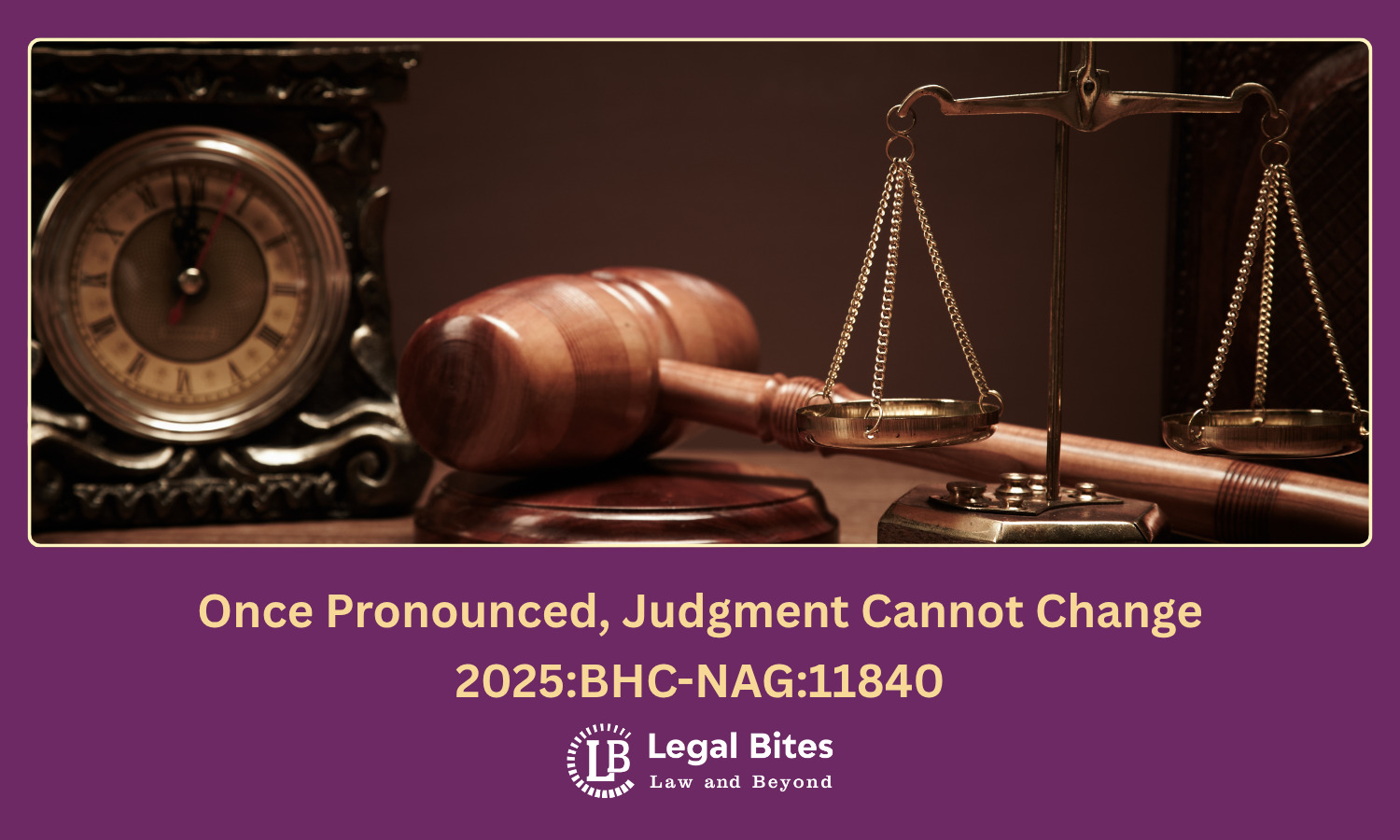
Finality of judgments is one of the cornerstones of criminal justice. Courts must be able to conclude proceedings with certainty, both for the sake of the accused and the prosecution. Once a criminal court signs and pronounces its judgment, the law places a clear embargo on altering, modifying, or reviewing that judgment—except in the narrowest circumstances. This rule is not merely procedural; it is fundamental to the stability, consistency, and fairness of the criminal justice system.
Section 362 of the Code of Criminal Procedure, 1973 (now reflected in Section 403 of the Bharatiya Nagarik Suraksha Sanhita, 2023) embodies this prohibition. It provides that once a judgment or final order is signed, the court becomes functus officio, meaning its authority over the matter ends.
Recently, the Bombay High Court (Nagpur Bench) reaffirmed this settled principle in Pintu Girdharilal Yadav v. State of Maharashtra (2025), where the applicant sought changes in sentencing years after his conviction had been affirmed by both the High Court and the Supreme Court. The judgment serves as a vital reminder: a criminal court cannot revisit or modify its judgment under the guise of “speaking to the minutes,” clarification, or inherent powers.
This article examines the legal framework, judicial principles, and policy reasons behind the unalterability of criminal judgments once signed and pronounced.
The Statutory Foundation: Section 362 CrPC / Section 403 BNSS
Section 362 CrPC emphatically states:
“No court, when it has signed its judgment or final order disposing of a case, shall alter or review the same except to correct a clerical or arithmetical error.”
This provision is mirrored word-for-word in Section 403 BNSS.
The prohibition is categorical and admits only two exceptions:
- Correction of clerical errors (e.g., spelling mistakes, mis-typed dates)
- Correction of arithmetical errors (e.g., mistakes in the calculation of a sentence)
The bar applies to all criminal courts—Trial Courts, High Courts, and even the Supreme Court when exercising powers akin to CrPC in criminal matters.
The legislative intent is clear:
- Criminal litigation must end, not continue endlessly.
- Neither party should be dragged into perpetual uncertainty.
- Courts should not be tempted to second-guess their own decisions unless expressly permitted by law.
Facts in Brief
- The applicant was convicted in 2006 for offences under Sections 376(g) and 506/34 IPC.
- He was awarded 10 years RI and 1 year RI, respectively.
- Neither the Trial Court nor the High Court directed the sentences to run concurrently.
- Appeals before both the High Court (2019) and the Supreme Court were dismissed.
- His conviction thus attained finality.
- In 2025—almost 19 years later—the applicant filed an Application for Speaking to the Minutes, seeking insertion of the phrase:
“both substantive sentences shall run concurrently.”
Applicant’s Argument
- The High Court, in its 2019 judgment, had inadvertently made an observation suggesting concurrent running of sentences.
- This “mistake,” he argued, should now be corrected.
- He invoked inherent powers and Section 528 BNSS (equivalent to Section 482 CrPC).
State’s Response
- The application was essentially a review disguised as a procedural correction.
- Section 362 CrPC completely barred such reconsideration.
- Sentencing under Section 31 CrPC is discretionary, and courts had consciously not directed concurrency, considering the heinous nature of the offence.
High Court’s Ruling
The Court dismissed the application, holding:
- Once a judgment reaches finality, it is unalterable.
- An application for “speaking to the minutes” cannot be used to modify substantive rights.
- The applicant had never raised the issue of concurrent sentences at trial, appeal, or SLP stages.
- Invoking inherent powers was impermissible in the face of a statutory bar.
- The issue of concurrency relates to sentencing discretion, not clerical error.
- The case involved a heinous gang rape, where concurrent sentencing was not warranted.
The Court, relying on Supreme Court precedents, concluded:
“No criminal court can review or alter its own judgment once signed and pronounced.”
Judicial Precedents Affirming the Bar on Altering Judgments
Some leading decisions include:
- Vikram Bakshi v. R.P. Khosla (2025): Finality is absolute; courts functus officio after signing.
- Sunil Kumar v. State of U.P. (2021): Courts should specify concurrency/consecutivity at the sentencing stage itself.
- Akhil Bharatvarshiya Marwari Agarwal Kosh (2019): Distinguishes clerical correction from substantive modification.
- State of Punjab v. Davinder Pal Singh Bhullar (2011): Only mistakes apparent on the face of the record can be corrected.
These precedents collectively make it clear that once a criminal judgment is signed, nothing short of a legislative permit can reopen it.
Conclusion
The rule that “once signed and pronounced, a criminal judgment becomes unalterable” is not merely statutory—it is essential for justice, order, and predictability. Section 362 CrPC (and Section 403 BNSS) enshrine this principle by prohibiting any modification of a judgment once signed, except for trivial clerical errors.
The Bombay High Court’s ruling in Pintu Girdharilal Yadav v. State of Maharashtra (2025) serves as a robust reaffirmation of this doctrine. A criminal court cannot, under the guise of speaking to the minutes, inherent powers, or humanitarian considerations, revisit its own judgment after it has attained finality.
Finality is fundamental. And in criminal law, it is non-negotiable.
Important Link
Law Library: Notes and Study Material for LLB, LLM, Judiciary, and Entrance Exams